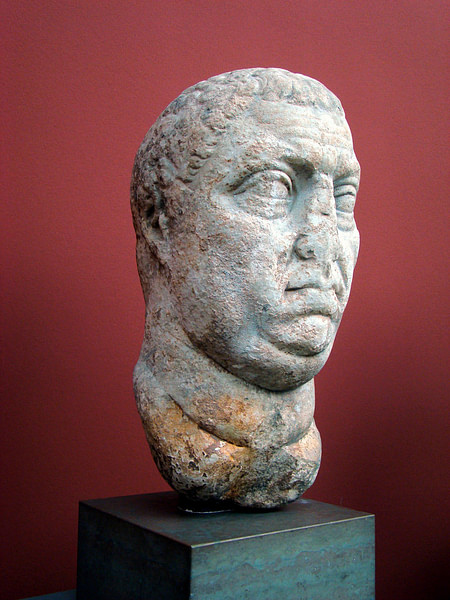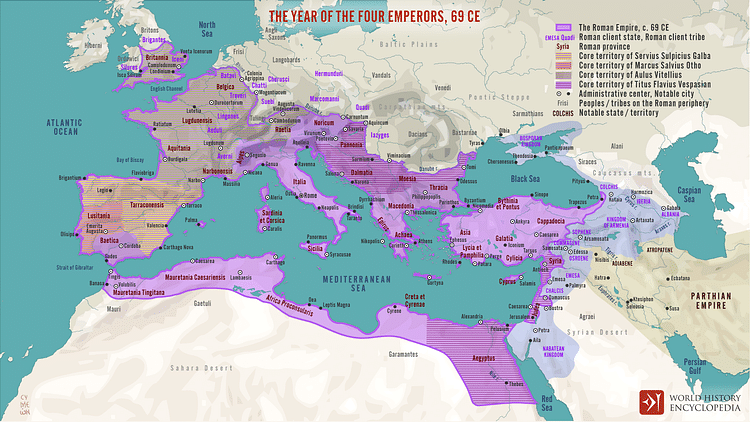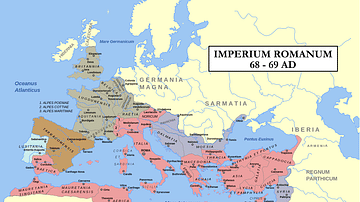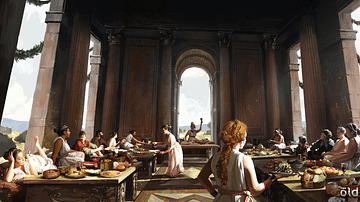
Vitellius was Roman emperor from April to December 69 CE. Vitellius was the third of the four emperors who ruled the Roman Empire in the year 69 CE. One of his predecessors, Galba, who had replaced the fallen Emperor Nero, was murdered by the Praetorian Guard for failing to keep promises to those who had put him in power. Emperor Otho, Galba's successor, committed suicide before the imposing armies of Vitellius reached Rome. He had chosen to sacrifice his own life instead of those of his men. Vitellius, like the previous two occupants of the throne, would not remain in power long.
Aulus Vitellius was born in September of 14 CE (there is some conflict as to the exact date). He was the son of Lucius Vitellius, a consul and former governor of Syria, and a noble woman Sextilia. Historian Suetonius in his The Twelve Caesars wrote that there were conflicting stories concerning his family, possibly noble, possibly not. Although accused of high treason (not uncommon in the Empire in those days), Lucius was still awarded a public funeral and a statue at Rosha. Vitellius spent most of his youth on the Isle of Capri with the self-imposed exile Emperor Tiberius. Later on, he would win the favour of three different emperors: Caligula (because of his chariot racing), Claudius (for his dice playing), and lastly Nero (who appreciated both of those talents). At many public events, Vitellius often persuaded Nero to sing and play the lute - something Nero rarely declined. Vitellius rose rapidly through various public offices eventually becoming Minister of Public Works and governor-general of Africa. He married twice: to Petroniana with whom he had one son (who was later poisoned, possibly by Vitellius) and to Galeria Fundana with whom he had one son and a daughter.
Throughout his public career, Vitellius was noted for two vices – gluttony and gambling; both would play a vital role in his future. Despite the lack of military experience, Emperor Galba made an unpopular decision and appointed him to be governor of Lower Germany in 68 CE. He felt Vitellius's vices would keep him from being a threat to his power. Suetonius wrote, “…. a glutton was the sort of rival whom he [meaning Galba] feared least, and that, he expected Vitellius to cram his belly with the fruits of the province.” The armies of Lower Germany, however, had a different view of the new governor-general - they welcomed him. They had little affection for Galba, even refusing to recognize him as the new emperor, and Galba had little love for them. Lower Germany had not participated in Galba's overthrow of Nero, thereby not benefitting from the financial gain that followed.
The army in Rome who had supported the new emperor soon became disgruntled with him. Much of the money that Galba gathered from tributes and land seizures was not spent on the troops but kept for himself. He no longer felt any loyalty to those who had put him on the throne. He would meet his death, however, at the hands of the Guard. Upon Galba's death, many favoured placing Vitellius on the throne; however, Otho, former governor of Lusitania, was named the emperor (mostly due to his role in Galba's assassination). According to Suetonius, many in the army of Lower Germany took an oath to support Vitellius, preferring him over Otho because he had “granted every favour asked of him.”
Upon ascending to the throne, Otho felt there was little need to fear Vitellius - the governor-general's quarrel had been with Galba, and he was dead. According to Suetonius, Vitellius, however, felt otherwise. When Vitellius heard of Galba's death, he divided his army into two separate divisions - one went to Gaul and one went to meet Otho north of Rome. According to Tacitus, “For most Romans the choice between Otho and Vitellius seemed to be simply one of two evils. It was the armies that decided, and the armies of Germany … were too much for Otho's praetorians and army of Italy.” Despite appeals from Otho, the two armies met at the First Battle of Bedriacum on April 16, 69 CE. It was on this day that Otho committed suicide. Although not present at the battle, Vitellius was immediately declared the new emperor and word was rushed to him in Gaul.

Prior to his assumption to the governorship of Germany, Vitellius has accumulated enormous debt (a result of his gambling habit). His position as emperor provided him an opportunity to rid himself of this massive debt. Suetonius said, “All the money-lenders, tax collectors and dealers who had ever dunned him at Rome, or demanded prompt payment for goods and services on the road, it is doubtful whether he showed mercy in a single instance.”
Many in Rome considered the new emperor to be cruel. Suetonius said he would kill or torture at “the slightest pretext.” Historian Cassius Dio wrote in his Roman History, “Vitellius, addicted as he was to luxury and licentiousness, no longer cared for anything else either human or divine … Now, when he was in a position of so great authority, his wantonness only increased, and he was squandering money most of the day and night alike.” As word of his diminished popularity among many in the army reached him, Vitellius became more generous in both public and private, hoping to maintain the loyalty of the troops. Suetonius wrote, “As things began to look bad for him, he began to show mercy.”
Many who had support Vitellius earlier began to swear allegiance to Titus Falvius Vespasianus (Vespasian), governor of Judea. When an attempted treaty failed (Vitellius had hoped to save himself from a sure death), the armies of the two met at the Second Battle of Bedriacum; Vitellius's men were soundly defeated. The soon-to-be dethroned emperor tried to escape Rome in disguise; however, he was captured by Vespasian's men, and while pleading for his life, he was dragged through the streets, tortured, killed (December 20, 69 CE) and thrown into the Tiber. Immediately, Vespasian was named the new emperor. Vitellius was fifty-six years old and had ruled for only eight months.







